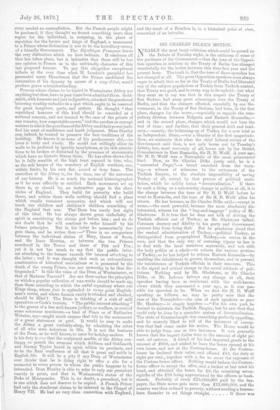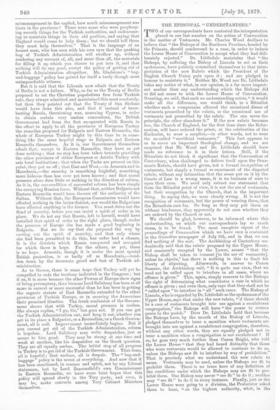SIR CHARLES DILKE'S MOTION.
NEARLY the most inept criticism which could be passed on the Debate of Tuesday night, is the criticism of some of the partisans of the Government—that the tone of the Opposi- tion speeches in relation to the Treaty of Berlin has changed. wonderfully for the better between this time last year and the present hour. The truth is, that the tone of those speeches has not changed at all. The great Opposition speakers were always eager to admit that so far as the Treaty of Berlin had liberated any of the subject populations of Turkey from Turkish control, that Treaty was good, and in every way to be upheld ; but what they went on to say was that in this respect the Treaty of San Stefano had some great advantages over the Treaty of Berlin, and that the changes effected, especially by our Go- vernment, in the Treaty of San Stefano, had been, in the first place, changes for the worse,—especially as regards the com- pulsory division between Bulgaria and Eastern Roumelia,- and in the second place, changes which would not bear the test of time ; and further, that their general drift and tend- oney,—namely, the bolstering-up of Turkey for a now trial as an independent State,—was a blunder of the first magnitude. Now, we maintain that what the chief Liberal critics of the Government said then, is not only borne out by Tuesday's debate, but, most curiously of all, borne out by the British Commissioner in East Roumelia, Sir II. D. Wolff. A year ago, Sir H. D. Wolff was a Tureophile of the most pronounced kind. Now, as Sir Charles Dilke justly said, he is a "converted Jingo,"—a brand snatched from the burn- ing,—a witness of witnesses to the rottenness of the Turkish Empire, to the absolute impossibility of saving Turkey at all, except by that process of political muti- lation, which he mildly terms "decentralisation." If there be such a thing as a noteworthy change in politics at all, it is the change between the tone of Sir H. D. Wolff before he went to Roumelia, and the tone of Sir H. D. Wolff after his return. He has become, as Sir Charles Dilke said,—except in name,—the most powerful, because the most absolutely dis- interested, witness for the " bag-and-baggage " policy of Mr. Gladstone. It is true that he does not talk of driving the Turkish officials out of Turkey, as Mr. Gladstone talked. Common decency and fidelity to his party and Government prevent him from doing that. But he proclaims aloud that the central administration of Tuikey,—political Turkey, as distinguished from geographical Turkey,—is rotten to the core, and that the only way of restoring vigour to her is to deal with the local members separately, and not with the body politic as a whole—to reform the various sections of Turkey, as he has helped to reform Eastern Roumelia—by enabling the inhabitants to govern themselves, and to prevent the interference of Turkish officials in their concerns. This is the signal and critical change in the moral attitude of poli- ticians. Nothing said by Mr. Gladstone, or Sir Charles Dilke, or Mr. Lefevre betrays any change at all, their speeches having been as consistent with the well-known views which they announced a year ago, as it was pos- sible for speeches to be. When we find Sir H. D. Wolff speaking as follows, we may be pretty sure that the ease of the Turcophiles—the case of such speakers as poor Mr. Hanbury—is simply hopeless :—" For, his own part, he desired to maintain the Turkish Empire, but he saw that that could only be done by a complete system of decentralisation. The state of Constantinople was something perfectly appalling, and he scarcely liked to tell of the instances of corrup- tion that had come under his notice. The House would be able to judge from one or two instances. It was generally known that the import duties were to the amount of eight per cent, ad valorem. A friend of his had imported goods to the amount of £800, and wished to have the boxes opened at his own house, and not at the Custom-house. At the Custom- house he declared their value, and offered £64, the duty at eight per cent., together with a fee to cover the expenses of the Custom-house officer. Nothing would induce the Custom- house officer to accept the offer, and a broker at last tried his hand, and obtained the boxes for £8, the remaining seven- eighths of the £64 being appropriated by the officers as back- sheesh. Probably of every £25,000,000 paid by the tax- payer, the State never gets more than £12,000,000, and the country was thus reduced to poverty, without needing a heaven-
born financier to set things straight If there was mismanagement in the capital, how much mismanagement was there in the provinces ? There were some who were prophesy- ing smooth things for the Turkish authorities, and endeavour- ing to maintain things in their old position, and saying that England would come to help them ; but we should tell them they must help themselves." That is the language of an honest man, who has seen with his own eyes that the quaking bog of Turkish Administration will swallow up, without rendering any account of, all, and more than all, the materials for filling it up which you choose to put into it, and that , nothing will do any good, except the policy of getting rid of Turkish Administration altogether. Mr. Gladstone's "bag- and-baggage " policy has gained for itself a tardy though most unimpeachable witness.
But it is said that the Liberals now admit that the Treaty of Berlin is not a failure. Why, so far as the Treaty of Berlin proposed to set the Christian populations free from Turkish rule, they always admitted and maintained this most resolutely, but then they pointed out that the Treaty of San Stefano would have done this also, and that if instead of brow- beating Russia, threatening war, annexing Cyprus, in order to obtain certain very useless concessions, the British 'Government had from the first co-operated with Russia in the effort to apply to all the provinces of European Turkey the remedies proposed for Bulgaria and Eastern Roumelia, the whole of European Turkey might by this time be in some- thing like the same hopeful stage as Bulgaria and Eastern Roumelia themselves. As it is, our Government themselves admit that, except in Eastern Roumelia, they have as yet done nothing ; that no step has been taken towards providing the other provinces of either European or Asiatic Turkey with safe local institutions ; that when the Turks are pressed on this point, they put us off ; that East and West,—in Armenia and in Macedonia,—the anarchy is something frightful, something more hideous than has ever yet been known ; and that moral pressure alone does little or nothing in the direction of reform. As it is, the one condition of successful reform has been simply the occupying Russian force. Without that, neither Bulgaria nor Eastern Roumelia would have thrown off the authority of the Sultan. Without that, the European Commission would have effected nothing in the latter district, nor would the Bulgarians have effected anything in the former. You must drive out the fiend of anarchy, before you can instal a spirit of order in its place. We do not say that Russia, left to herself, would have installed that spirit of order in the right place, though under the pressure of Europe she has made a good beginning in Bulgaria. But we do say that she prepared the way by -casting out the spirit of anarchy, and that only where she had been permitted to do this, has order had a chance. It is the districts which Russia conquered and occupied for which there is hope. For the others, as yet, there is no hope. Armenia, though it is under the most special British protection, is as badly off as Macedonia,—trod- den down by the incarnate greed and lust of Turkish ad- ministration.
As to Greece, there is some hope that Turkey will yet be compelled to cede the territory indicated in the Congress ; but if so, it is more because the other Powers of Europe show signs of being peremptory, than because Lord Salisbury has been at all more in earnest or more successful than he has been in getting the organic statute of East Rounaelia extended to the other provinces of Turkish Europe, or in securing the Armenians their promised liberties. The frank confession of the Govern- ment shows that with Turkey, moral pressure is useless. She always replies, "I go, Sir," but goes not. If you can get the Turkish Administration out, and keep it out, whether you get in its place a Bulgarian, or a Roumelian;or a Greek Govern- ment, all is well. Improvement immediately begins. But if you cannot get rid of the Turkish Administration, reform is hopeless. Lord Salisbury may write despatches, just as seems to him good. They may be strong at one time and weak at another, like his despatches on the Greek question. They are all equally useless. The initial step of all progress in Turkey is to get rid of the Turkish Government. That done, all is hopeful ; that undone, all is despair. The " bag-and- baggage ' policy is the secret of everything. And now that it has been sanctioned, in essence and spirit, not by any Liberal statesman, but by Lord Beaconsfield's own Commissioner in Eastern Roumelia, we have some faint hopes that this policy will spread slowly in the Tory party, and even, it may be, make converts among Tory Cabinet Ministers themselves.



































 Previous page
Previous page